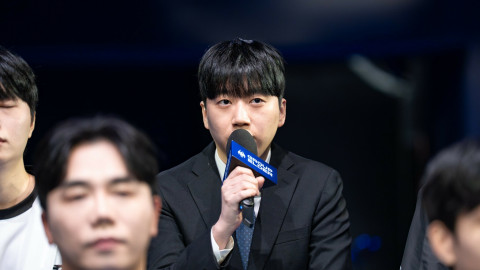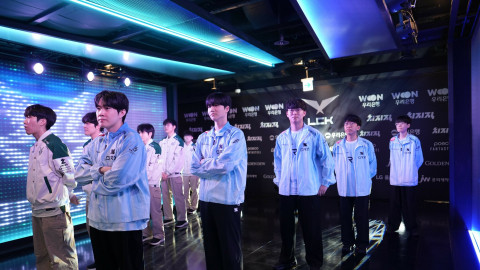
As part of an ex parte application on Wednesday, Riot Games and their CEO Nicolo Laurent finally filed their official answer to the allegations of sexual harassment and discrimination made against them by Sharon O’Donnell in a lawsuit that she filed in January.
In their response, the company and Laurent generally denied all of the plaintiff's allegations and mounted an assault on her credibility.
The official response was filed as a part of an ex parte application submitted to the court on Wednesday, in which Riot Games requested a status conference from the court to address Sharon O’Donnell’s alleged harassment and threatening of potential witnesses in her case against the company and Laurent. Along with the ex parte application, they included a declaration of support from Riot's legal counsel Catherine A. Conway that contained five exhibits of evidence. Among the exhibits of evidence was Exhibit C, which was entitled "Defendant Nicolo Laurent’s Answer to Plaintiff’s Complaint."
Wednesday’s filing comes only a day after Riot concluded an internal investigation, finding that Laurent had not harassed or discriminated against O’Donnell.
Riot Games and Laurent respond to the allegations
Riot Games and Laurent “unequivocally denied” all of the charges leveled at them by the plaintiff in their answer. In the lengthy Exhibit C, the defendants offered a primary defense of general denial, followed by 32 separate and additional legal defenses. We will focus on their primary defense in this article. Here is a summary of the major contentions made by the defense in their answer.
Laurent denied that made inappropriate comments to the plaintiff
In the first section of the answer, Laurent explicitly denied the claims that:
- he made any comments about the plaintiff's appearance
- he discussed underwear of any kind
- he yelled at her
- he asked about her personal life
Laurent denied that he requested the plaintiff “cum” to his house while he was alone there
Laurent said that he had never asked the plaintiff to come over to his house when he was alone. He also denied sending messages asking her to “handle him” or “cum over.” According to the response, the language that he is accused of using appears nowhere in many years of emails and texts between Laurent and O’Donnell.
Laurent denied instructing the plaintiff to schedule his time so he doesn’t have to be with his wife
Not only did Laurent deny this claim, but he also argued that he on multiple occasions requested the plaintiff ensure his professional obligations don’t interfere with his time with his family. According to the answer, Laurent’s commitment to his family is well known across the leadership team.
Laurent denied discussing his personal relationship with his wife with the plaintiff in any regard
He denied telling the plaintiff that his wife was “jealous of beautiful women” or any other personal comments relating to his wife or his relationship with her. Laurent said the only time his wife was discussed was when O’Donnell assisted him in coordinating birthdays, dinner reservations, and other logistical matters.
Laurent denied asking the plaintiff to travel with him for reasons beyond her duties as an assistant
According to the answer, the plaintiff only traveled to a few events, and in each case, they traveled separately from the CEO and stayed in separate accommodations. Further, Laurent claims that they were never alone at these events, and instead surrounded by other colleagues.
Laurent clarified his comments about women having children to handle stress
Laurent said that the claim that he told female employees that they can help handle the stress of COVID-19 by having children has been “exaggerated.”
He explained that he was making a joke in response to a question at a meeting about stress levels, and made the comment about having children in relationship to his experience as a father working from home who values having his children so nearby. He also said that he personally apologized to the employee who submitted the question and acknowledged his comment was hurtful and addressed the comment later in a video message to all employees.
Riot denies firing the plaintiff for her complaining to HR
In the second section of their answer, Riot and Laurent set out to undermine the plaintiff's credibility and demonstrate the legitimate grounds for her firing. They argued that there is no significant evidence for any of her story and that she was not fired for refusing advances from Laurent or for reporting any such incident to HR.
Riot pointed to multiple examples of the plaintiff misrepresenting information to Riot during her employment. They also argued that O’Donnell engaged in blackmail and paid testimony in the past, and pointed to the two cases of witness tampering mentioned earlier in Wednesday’s filing as evidence that she is once again engaged in witness tampering.
Riot also claimed that O’Donnell misrepresented, or in some cases straight fabricated, key information during the Riot hiring process. According to Riot, when she was being interviewed for her role, O’Donnell claimed she had worked as an assistant to Larry Ellison, made up fake identities for her references, and claimed that she was eligible to work during the U.S. immediately upon hiring when she was not.
In their answer, Riot claimed that the plaintiff was terminated due to a number of complaints from a variety of employees.
“Employees of all genders, and in a variety of roles, came to Laurent with concerns about Plaintiff and how Plaintiff might have negatively impacted Laurent’s ability to run the business,” Riot explained.
They listed multiple examples of poor behavior from O’Donnell in 2018 and 2019. Further, according to Laurent the plaintiff didn’t take feedback and would become defensive rather than taking responsibility for her actions. According to Riot, in 2019 and 2020 alone over a dozen employees complained to HR about her unprofessional behavior and communication. They claim that these complaints provided the foundation for her dismissal.
Perhaps most important to their argument, Riot said that although O’Donnell was safe to raise her concerns to HR, she actually never did.
“Despite having ample opportunity to do so, Plaintiff never made any allegations about harassment, discrimination, retaliation, or her classification as an exempt employee during the entire course of her employment or after her termination,” Riot explained in their answer. “Indeed, as further explained below, the only time Plaintiff came even remotely close to a policy violation investigation during her employment was in 2018, when Plaintiff attempted to intervene on behalf of a male employee being terminated because she was concerned that Riot was too quick to terminate men based on harassment accusations.”
Riot further denied the assertion that female employees are treated as second-class citizens, and touted the changes they have made over the past few years in regards to gender inclusion at Riot after the release of Kotaku’s 2018 report about gender discrimination at Riot games.
“While Riot acknowledges that individuals, on isolated bases, have claimed to experience conduct and treatment falling below the standards of professionalism and inclusiveness that Riot has hoped to achieve, Plaintiff is not one of them,” Riot concluded.
In addition to their thorough denials, Riot and Laurent filed 32 separate and additional legal defenses from the charges. For those interested in reading all of the specifics, find the original filing here.
Riot files ex parte application in response to witness harassment
The answers provided by Laurent and Riot were part of a larger application on Wednesday, in which Riot requested an ex parte order to set a status conference with the court to discuss O'Donnell's actions of “witness tampering” and “apparent harassment” of potential witnesses.
An ex parte order refers to an order that can be granted by a court without a response from the other party. Examples would include temporary restraining orders or in this case a request for a conference with the court to address witness tampering.
According to Riot’s request, “defendants have learned that Plaintiff has engaged in harassing and/or apparently threatening behavior toward potential witnesses in this action — as recently as last week — including that she offered and individual compensation for testifying on her behalf; encouraged individuals to file a lawsuit against Mr. Laurent and/or join in her lawsuit so they can personally benefit, despite the individuals having stated they have no claim against Mr. Laruent; likely disseminated private contact information of witnesses to the press; and likely encouraged individuals to threaten witnesses on her behalf.”
Riot Games went on to say, “Defendants respectfully request that the Court set a status conference as soon as practicable from the date of the hearing on this application so that the Court can provide guidance to the parties as to how to proceed regarding Defendants’ concerns as set forth in this Application.”
In support of this request, Riot supplied two exhibits from anonymous women describing their experiences being harassed, threatened, and repeatedly contacted by the plaintiff in an attempt to get them to testify against Laurent and Riot.
-

Aaron is an esports reporter with a background in media, technology, and communication education.
Sort by:
Comments :0





